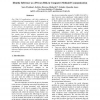Free Online Productivity Tools
i2Speak
i2Symbol
i2OCR
iTex2Img
iWeb2Print
iWeb2Shot
i2Type
iPdf2Split
iPdf2Merge
i2Bopomofo
i2Arabic
i2Style
i2Image
i2PDF
iLatex2Rtf
Sci2ools
116
click to vote
HICSS
2009
IEEE
2009
IEEE
Identity Inference as a Privacy Risk in Computer-Mediated Communication
New Web 2.0 applications, with their emphasis on collaboration and communication, hold the promise of major advances in social connectivity and coordination; however, they also increase the threats to user privacy. An important, yet under-researched privacy risk results from social inferences about user identity, location, and activities. In this paper, we frame the ‘social inference problem’. We then present the results from a 292 subject experiment that highlights: 1) the prevalence of social inference risks; 2) people’s difficulties in accurately predicting social inference risks; and 3) the relation between information entropy and social inference. We also show how to predict possible social inferences by modeling users’ background knowledge and calculating information entropy and discuss how social inference support systems can be deployed that protect user privacy.
Related Content
| Added | 19 May 2010 |
| Updated | 19 May 2010 |
| Type | Conference |
| Year | 2009 |
| Where | HICSS |
| Authors | Sara Motahari, Sotirios G. Ziavras, Richard P. Schuler, Quentin Jones |
Comments (0)

